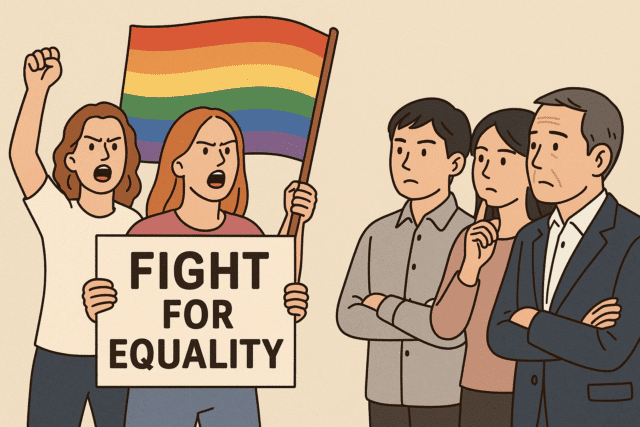These days, not only in Korea but also in Western societies, there is a lot of noise about ‘identity politics.’ A single advertisement, a scene in a drama, or the setting of a movie character can become a source of controversy. One side curses, saying “feminists are being too feminist,” “it’s tainted by PC,” while the other side bites back with “uneducated fools,” “stop making discriminatory remarks.” We’re seeing a landscape reminiscent of the Cold War era, when ideology divided the world in half, with ideological beliefs preceding the essence of things.요즘 한국은 물론 서구 사회까지 온통 ‘정체성 정치’로 시끄럽다. 광고 하나, 드라마 한 장면, 영화의 등장인물 설정 하나가 논란의 불씨가 된다. 한 쪽에서는 *”페미가 페미했다”, “PC로 더럽혀졌다” *라고 욕하고, 반대편에서는 *”못 배워먹은 것들”*, *”차별적인 발언을 멈춰라”* 하고 물어뜯는다. 사물의 본질에 사상이 앞서는, 이데올로기가 세상을 반으로 갈랐던 냉전 시대에나 보던 풍경이 나타나고 있다.
Amidst all this global commotion, there is one country that remains notably quiet. That country is Japan.세상이 이런 와중에 유독 조용한 나라가 있다. 바로 일본이다.
 Source: ChatGPT
Source: ChatGPT
The West and Korea, where DEI and feminism have swallowed industries
The West is experiencing growing pains with DEI (Diversity, Equity, Inclusion) policies and PC (Political Correctness) movements. Marvel and Disney are being shunned by audiences after forcefully pushing female and minority characters at the expense of the original works. Initially, this trend might have accelerated because it was profitable, but now there seems to be a growing voice among the public denouncing “fatigue from excessive measures.”서구는 DEI(다양성, 형평성, 포용성) 정책과 PC(정치적 올바름)운동으로 진통을 겪고 있다. 마블과 디즈니는 원작을 훼손하면서까지 여성·유색인종 캐릭터를 무리하게 밀어붙이다가 관객의 외면을 당하고 있다. 처음에는 그것이 아마 돈이 되었기 때문에 이런 흐름이 가속화되었겠지만 이제 슬슬 대중 사이에서 **”지나치다”는 피로감**을 성토하는 목소리가 커지는 듯 하다.
In corporate settings, this phenomenon manifests as overzealous DEI policies. It’s not uncommon to see criticism that these policies erode corporate competitiveness by evaluating and promoting employees based on gender rather than ability. It’s widely understood that the anger of white American men who felt they were victims of reverse discrimination contributed to Trump’s election.이런 현상이 기업 현장에서는 무리한 DEI 정책의 형태로 나타나고 있다. 능력이 아니라 성별로 직원을 평가하고 진급시켜서 **기업 경쟁력을 갉아먹는다**고 비판받는 경우가 심심치 않다. 역차별 당했다고 느낀 미국 백인 남성들의 분노가 트럼프 당선을 불러왔다는 것은 널리 알려진 해석이다.
Meanwhile, Korea has been suffering from ‘feminist’ controversies for nearly a decade. Similar to the ‘Ilbe’ controversies that once swept through broadcasting, numerous disputes have arisen over ‘that finger’ cleverly hidden in various illustrations and content. There was even an incident where the webtoon ‘Isekai PongPong Man,’ which satirizes gender conflicts, was censored by its platform, Naver. And a game illustration outsourcing company was caught hiding their ideology in their work and faced severe backlash from users. It seems reasonable to say that ideology is encroaching on industry in both the West and Korea.한편 한국의 경우에는 거의 십 년째 ‘페미’로 홍역을 앓고 있다. 예전에 방송가에 불었던 ‘일베’ 논란처럼, 각종 일러스트나 컨텐츠에 교묘하게 숨겨진 ‘그 손가락’에 수많은 논란이 일었다. 젠더 갈등을 풍자하는 웹툰 ‘이세계 퐁퐁남’이 플랫폼인 네이버로부터 검열당한 일도 있었고, 게임 일러스트 외주업체가 그들의 사상을 작업물에 은밀히 숨기다 유저들에게 걸려서 십자포화를 맞기도 했다. 서양이나 한국이나 **사상이 산업을 잠식한다**는 말이 나올 법도 하다.
Living in Japan, all these issues feel somewhat distant. There are no heated debates about women’s quotas in politics, nor are there men and women fighting over illustrations with strange finger gestures in advertisements. Some progressive Western media outlets even criticize Japan for being “too insensitive to diversity and inclusion.” Yet, Japan’s Immigration Bureau is overflowing with people immigrating to Japan. What explains this seemingly contradictory phenomenon?세상이 이런 데 일본 사는 입장에서는 좀 남의 일 같은 느낌이 든다. 정치권에서 여성 할당제 논쟁이 들끓는 일도 없고, 광고에 기묘한 손가락 제스쳐를 취하는 일러스트 가지고 남녀가 서로 싸우지도 않는다. 진보적인 일부 서구 언론사에서는 “일본은 다양성과 포용에 너무 둔감하다”고 비판할 정도다. 그런데 일본 재류관리국은 일본으로 이민오는 사람들로 미어터진다. 일견 모순된 이런 현상은 대체 뭘까.
Japan does engage in PC, but only for show
Japan is not completely unrelated to PC movements or DEI. Japanese large corporations, especially those requiring a global sensibility, are running various ‘diversity campaigns.’ Increasing the number of female executives, specifying employment rates for people with disabilities, LGBTQ-friendly policies—on the surface, it doesn’t look different from the West. But in reality, most of these efforts remain at the level of ‘just for show.’일본이라고 해서 아예 PC운동이나 DEI와 무관한 건 아니다. 특히 글로벌 감각을 요구받는 일본 대기업들은 다양한 ‘다양성 캠페인’을 운영 중이다. 여성 임원 수 확대, 장애인 고용 비율 명시, 성소수자 친화 정책 등 겉으로 보기에는 서구와 다르지 않다. 하지만 실상을 보면 이 모든 것은 **‘그저 보여주기’ 수준에 그치는 경우가 많다.**
For example, while the number of female executives has increased, cases where they hold substantial authority are rare. For instance, statistics show that by 2022, over 20% of companies listed on the Tokyo Stock Exchange Prime Market had female directors, but the percentage of female CEOs remained at around 1%. This is because most are appointed as outside directors with no direct involvement in business operations. Regarding LGBTQ issues, despite promotional articles in newspapers about various new policies, the actual company atmosphere hardly changes. If anything has changed, it might just be rainbow illustrations on the company intranet login page.일례로 여성 임원이 늘어났다고 하지만, 그들이 실질적 권한을 쥐고 있는 경우는 드물다. 예를 들어, 2022년 기준 도쿄증권거래소 프라임 시장 상장기업 중 여성 이사가 있는 기업 비율은 20%를 넘었지만, 여성 CEO 비율은 여전히 1%대에 머물고 있다는 통계가 있다. 대부분 사업과 직접적으로 무관한 사외 이사로 선임하기 때문이다. LGBTQ 관련해서도 이러저러한 정책들을 새로 집행하겠다고 신문에 홍보 기사가 나가지만, 정작 회사 분위기는 별로 바뀐 게 없다. 바뀐 게 있다면 회사 인트라넷 접속 페이지에 무지개색 일러스트가 들어간 정도?
In other words, Japan isn’t very interested in PC, DEI, or feminism.**즉, 일본은 PC나 DEI, 페미니즘에 별로 관심이 없다.**
Understanding Japanese thought patterns helps explain why Japanese society is so indifferent to the whirlwind sweeping the world.세계를 휩쓰는 광풍에 대해 일본 사회가 이렇게 무관심한 까닭은 일본인들의 사고 방식을 알면 이해할 수 있다.
Japan sees ‘roles’ before ‘people’
I’ve written about this before: Japanese people don’t really mind if female body scrubbers enter men’s baths or male cleaners enter women’s baths.전에 이런 글을 쓴 적이 있다. 일본인들은 남탕에 여자 세신사가 들어가고 여탕에 남자 청소부가 들어가도 별로 신경쓰지 않는다는 글이다.
There are women who enter men’s baths in Japan (https://roughtough.tistory.com/7)일본에는 남탕에 들어가는 여자가 있다(https://roughtough.tistory.com/7)
There are women who enter men’s baths in Japan
It was my first time going to a local bathhouse after coming to Japan. I made a reservation to get a body scrub after a long time, but the scrubber was a woman who looked about thirty. A woman in the men’s bath? I was startled and hurriedly
roughtough.tistory.com
In Korea, if such a situation became known, it would immediately spark major controversy in the news and online, and the business would likely close under public pressure. In contrast, in Japan, not only is there no significant social reaction, but it’s considered normal—because they think that the body scrubber entered the men’s bath not because they’re male or female, but because their job is to be a body scrubber. What’s the problem with a men’s bath scrubber entering a men’s bath or a women’s bath cleaner entering a women’s bath?한국이라면 이런 상황이 알려지는 즉시 뉴스와 온라인에서 대대적인 논란으로 번지고, 해당 업체는 여론의 압박에 폐업할 것이다. 반면 일본에서는 큰 사회적 반향은 커녕 그게 당연하다고 여기는데, 그것은 남탕에 들어온 세신사가 남성이냐 여성이냐 이전에 맡은 일이 세신사니까 들어왔을 뿐이라고 생각하기 때문이다. 남탕 때밀이가 남탕에 들어가고 여탕 청소부가 여탕에 들어가는데 뭐가 문제냐는 말이다.
Because this way of thinking is deeply rooted in the Japanese consciousness, it’s difficult for political correctness or feminism to gain public support in Japan. After all, the role is more important, and who performs it is a secondary issue.이런 사고방식이 일본인의 의식 구조 깊숙한 곳에 이미 뿌리박혀 있기 때문에, **일본에서는 정치적 올바름이니 페미니즘이니 하는 것들이 대중의 지지를 얻기가 힘들다.** 어차피 역할이 더 중요하고 그게 누구냐는 그 다음 문제이기 때문이다.
Additionally, Japanese society has a strong tendency to avoid causing disturbances. They’re careful not to let any issue develop into a debate that could shake the entire society, and they prefer to ‘quietly move on’ even if something is somewhat unreasonable. That’s why radical social movements occurring in the West or Korea are objects of criticism—because they’re noisy.여기에 더해, 일본 사회는 **소란을 일으키는 것 자체를 경원시하는** 풍조가 강하다. 어떤 이슈든 사회 전체를 흔들만한 논쟁으로 번지지 않게끔 조심하고, 다소 불합리하더라도 ‘조용히 넘어가는 것’을 선호하는 경향이 있다. 그렇기 때문에 서양이나 한국에서 벌어지는 급진적인 사회 운동은 지탄의 대상이다. 시끄럽기 때문이다.
A clean zone or a windless zone?
This is probably why people tired of excessive feminism and PC-ism view Japan as a ‘last bastion.’ In reality, as it was in the past and remains today, it seems unlikely that PC movements or feminist movements will sweep through Japanese society in the future.최근 과도한 페미니즘과 PC주의에 지친 사람들이 일본을 ‘최후의 보루’처럼 여기는 것은 그래서일 것이다. 실제로도 일본에서라면 과거에도 그랬고 현재도 그렇듯이, 앞으로도 PC 운동이나 페미니즘 운동이 사회를 휩쓰는 일은 일어나기 힘들 듯 하다.
It’s clearly not a matter of good or bad. It’s just that Japan has different standards.좋고 나쁨의 문제는 분명 아닌 듯 하다. 단지 일본은 **기준이 다르기 때문에 그럴 뿐이다.**
One thing is certain: at least in the near future, we’re unlikely to see Black male geishas appearing in Japanese games.아무튼 확실한 것은, 적어도 가까운 미래에, **일본 게임 속에 흑인 남성 게이샤가 등장할 일은 없을 듯 하다는 것이다.**
